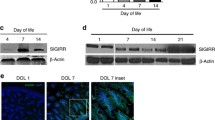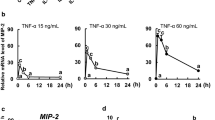Abstract
Background
Intestinal ischemia/reperfusion (I/R) disrupts intestinal mucosal integrity and immunoglobulin A (IgA) generation. It has recently been shown that the programmed cell death-1 receptor (PD-1) plays a crucial role in regulating intestinal secreted IgA (sIgA).
Aims
To evaluate changes in PD-1 and PD-ligand 1 (PD-L1) expression on Peyer’s patches (PP) CD4+ T cells and to investigate the correlation between PD-1/PD-L1 and intestinal IgA production/mucosal integrity in mice following intestinal I/R.
Methods
I/R injury was induced by clamping the superior mesenteric artery for 1 h followed by 2-h reperfusion. PD-1/PD-L1 expression on PP CD4+ T cells was measured in I/R and sham-operated mice. Additionally, transforming growth factor-β1 (TGF-β1) and interleukin-21 (IL-21) mRNA in CD4+ T cells and IgA+ and IgM+ in PP B cells, as well as intestinal mucosal injury and sIgA levels, were assessed.
Results
PD-1/PD-L1, TGF-β1, and IL-21 expression was down-regulated after intestinal I/R. Furthermore, IgA+ B cells decreased and IgM+ B cells increased in mice with intestinal I/R. Importantly, decreased PD-1/PD-L1 expression was correlated with increased mucosal injury and decreased IgA levels, as well as with decreased TGF-β1 and IL-21 expression.
Conclusions
Intestinal I/R inhibits PD-1/PD-L1 expression on PP CD4+ T cells, which was associated with an impaired intestinal immune system and mechanical barriers. Our study indicates that PD-1/PD-L1 expression on CD4+ T cells may be involved in the pathogenesis of intestinal I/R injury.





Similar content being viewed by others
References
Mallick IH, Yang W, Winslet MC, et al. Ischemia-reperfusion injury of the intestine and protective strategies against injury. Dig Dis Sci. 2004;49:1359–1377.
Feinman R, Deitch EA, Watkins AC, et al. HIF-1 mediates pathogenic inflammatory responses to intestinal ischemia-reperfusion injury. Am J Physiol Gastrointest Liver Physiol. 2010;299:G833–843.
Martin B. Prevention of gastrointestinal complications in the critically ill patient. AACN Adv Crit Care. 2007;18:158–166.
Zhang XY, Liu ZM, Wen SH, et al. Dexmedetomidine administration before, but not after, ischemia attenuates intestinal injury induced by intestinal ischemia-reperfusion in rats. Anesthesiology. 2012;116:1035–1046.
Liu KX, Li YS, Huang WQ, et al. Immediate postconditioning during reperfusion attenuates intestinal injury. Intensive Care Med. 2009;35:933–942.
Li H, Wu GH, Chen J. Effect of glucagon-like peptide 2 on the intestinal mucosal immunity and correlative cytokines in mice with gut ischemia/reperfusion injury. Zhonghua Wei Chang Wai Ke Za Zhi. 2006;9:67–70.
Fukatsu K, Sakamoto S, Hara E, et al. Gut ischemia-reperfusion affects gut mucosal immunity: a possible mechanism for infectious complications after severe surgical insults. Crit Care Med. 2006;34:182–187.
Yoshiya K, Lapchak PH, Thai TH, et al. Depletion of gut commensal bacteria attenuates intestinal ischemia/reperfusion injury. Am J Physiol Gastrointest Liver Physiol. 2011;301:G1020–1030.
Pabst O. New concepts in the generation and functions of IgA. Nat Rev Immunol. 2012;12:821–832.
Fagarasan S, Kawamoto S, Kanagawa O, et al. Adaptive immune regulation in the gut: T cell-dependent and T cell-independent IgA synthesis. Annu Rev Immunol. 2010;28:243–273.
Agata Y, Kawasaki A, Nishimura H, et al. Expression of the PD-1 antigen on the surface of stimulated mouse T and B lymphocytes. Int Immunol. 1996;8:765–772.
Sharpe AH, Wherry EJ, Ahmed R, et al. The function of programmed cell death 1 and its ligands in regulating autoimmunity and infection. Nat Immunol. 2007;8:239–245.
Schreiner B, Mitsdoerffer M, Kieseier BC, et al. Interferon-beta enhances monocyte and dendritic cell expression of B7-H1 (PDL1), a strong inhibitor of autologous T-cell activation: relevance for the immune modulatory effect in multiple sclerosis. J Neuroimmunol. 2004;155:172–182.
Esch KJ, Juelsgaard R, Martinez PA, et al. Programmed death 1-mediated T cell exhaustion during visceral leishmaniasis impairs phagocyte function. J Immunol. 2013;191:5542–5550.
Simone R, Piatti G, Saverino D. The inhibitory co-receptors: a way to save from anergy the HIV-specific T cells. Curr HIV Res. 2009;7:266–272.
Kawamoto S, Tran TH, Maruya M, et al. The inhibitory receptor PD-1 regulates IgA selection and bacterial composition in the gut. Science. 2012;336:485–489.
Chiu CJ, McArdle AH, Brown R, et al. Intestinal mucosal lesion in low-flow states. I. A morphological, hemodynamic, and metabolic reappraisal. Arch Surg. 1970;101:478–483.
Seo GY, Youn J, Kim PH. IL-21 ensures TGF-beta 1-induced IgA isotype expression in mouse Peyer’s patches. J Leukoc Biol. 2009;85:744–750.
Godínez-Victoria M, Drago-Serrano ME, Reyna-Garfias H, et al. Effects on secretory IgA levels in small intestine of mice that underwent moderate exercise training followed by a bout of strenuous swimming exercise. Brain Behav Immun. 2012;26:1300–1309.
Duraiswamy J, Kaluza KM, Freeman GJ, et al. Dual blockade of PD-1 and CTLA-4 combined with tumor vaccine effectively restores T-cell rejection function in tumors. Cancer Res. 2013;73:3591–3603.
Belai EB, de Oliveira CE, Gasparoto TH, et al. PD-1 blockage delays murine squamous cell carcinoma development. Carcinogenesis. 2014;35:424–431.
Zhang Y, Zhou Y, Lou J, et al. PD-L1 blockade improves survival in experimental sepsis by inhibiting lymphocyte apoptosis and reversing monocyte dysfunction. Crit Care. 2010;14:R220.
Guignant C, Lepape A, Huang X, et al. Programmed death-1 levels correlate with increased mortality, nosocomial infection and immune dysfunctions in septic shock patients. Crit Care. 2011;15:R99.
Ji H, Shen X, Gao F, et al. Programmed death-1/B7-H1 negative costimulation protects mouse liver against ischemia and reperfusion injury. Hepatology. 2010;52:1380–1389.
Jaworska K, Ratajczak J, Huang L, et al. Both PD-1 ligands protect the kidney from ischemia reperfusion injury. J Immunol. 2015;194:325–333.
Stavnezer J, Kang J. The surprising discovery that TGF beta specifically induces the IgA class switch. J Immunol. 2009;182:5–7.
Carter L, Fouser LA, Jussif J, Fitz L, et al. PD-1:PD-L inhibitory pathway affects both CD4(+) and CD8(+) T cells and is overcome by IL-2. Eur J Immunol. 2002;32:634–643.
Freeman GJ, Long AJ, Iwai Y, et al. Engagement of the PD-1 immunoinhibitory receptor by a novel B7 family member leads to negative regulation of lymphocyte activation. J Exp Med. 2000;192:1027–1034.
Fagarasan S, Honjo T. Regulation of IgA synthesis at mucosal surfaces. Curr Opin Immunol. 2004;16:277–283.
Kato LM, Kawamoto S, Maruya M, et al. Gut TFH and IgA: key players for regulation of bacterial communities and immune homeostasis. Immunol Cell Biol. 2014;92:49–56.
Suzuki K, Meek B, Dous Y, et al. Aberrant expansion of segmented filamentous bacteria in IgA-deficient gut. Proc Natl Acad Sci USA. 2004;101:1981–1986.
Fagarasan S, Muramatsu M, Suzuki K, et al. Critical roles of activation-induced cytidine deaminase in the homeostasis of gut flora. Science. 2002;298:1424–1427.
Phalipon A. Anti-inflammatory role for intracellular dimeric immunoglobulin a by neutralization of lipopolysaccharide in epithelial cells. Immunity. 2003;18:739–749.
Aytekin C, Tuygun N, Gokce S, et al. Selective IgA deficiency: clinical and laboratory features of 118 children in Turkey. J Clin Immunol. 2012;32:961–966.
Wang N, Shen N, Vyse TJ, et al. Selective IgA deficiency in autoimmune diseases. Mol Med. 2011;17:1383–1396.
Strugnell RA, Wijburg OL. The role of secretory antibodies in infection immunity. Nat Rev Microbiol. 2010;8:656–667.
Acknowledgments
This study was supported by Grant 81270456 and 81171847 from the National Natural Science Foundation of China (to Dr. K-X Liu), and grants S2013010015398 from the Natural Science Foundation of Guang Dong Province, China (to Dr. Xu-yu Zhang).
Conflict of interest
None.
Author information
Authors and Affiliations
Corresponding author
Additional information
Xu-Yu Zhang and Zi-Meng Liu have contributed equally to this work.
Rights and permissions
About this article
Cite this article
Zhang, XY., Liu, ZM., Zhang, Hf. et al. Decreased PD-1/PD-L1 Expression Is Associated with the Reduction in Mucosal Immunoglobulin A in Mice with Intestinal Ischemia Reperfusion. Dig Dis Sci 60, 2662–2669 (2015). https://doi.org/10.1007/s10620-015-3684-y
Received:
Accepted:
Published:
Issue Date:
DOI: https://doi.org/10.1007/s10620-015-3684-y




